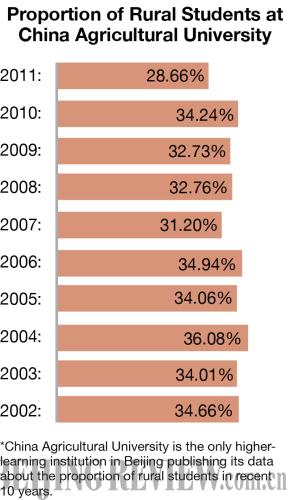|
Financial burden
"It has become harder for students from rural areas to move up the social ladder," said Yang Dongping from the Beijing Institute of Technology. "This is really a dangerous signal for Chinese society."
According to his research, most students from rural areas only attend local colleges and polytechnic schools.
In central China's Hubei Province from 2002 to 2005, for example, the proportion of rural students at junior colleges rose from 39 to 62 percent, and at military and normal colleges went from 33 to 57 percent.
"A better university means a better chance of landing a good job after graduation. The lower chance of entering prestigious universities places students from rural areas at permanent disadvantage relative to their urban counterparts," Yang said.
According to Yang's survey, a large number of urban students receive help from their parents, particularly in terms of introductions and contacts, when they are looking for jobs.
"Given the difficulties they face both in getting into universities and finding jobs, more and more rural children are choosing not to pursue higher education. They think there is no meaning in going to a university," Xiong said.
According to a survey, among the 9.46 million registered candidates in 2010, nearly 1 million finally gave up the national college entrance examination. Most of those who quit were from rural areas. Other rural students leave school even earlier and chose to study in technical schools or seek jobs directly.
The high cost of a university education plus the difficulty of finding a job after graduation has contributed to the prevailing idea in the countryside that "education is useless."
For instance, in Beijing, college students have to pay an average of 5,000 yuan ($782) for a year's tuition, students also have to pay living costs of around 10,000 yuan ($1,564) a year. That's almost the same as an average rural household's income.
Sending a child to university can cost the equivalent of 10 years' household income of a rural family in Gansu's Huining County, according to the People's Daily, the country's leading newspaper.
"Instead of offering opportunities to young people from rural areas to move up social classes through education, the tertiary education system is reinforcing the social divide in the country," said Liu Yunshan of Peking University.
For a long time, the government has invested in top universities, but many private vocational and junior colleges have no access to state investment, subsidies or social donations.
"Education equity also means the choice of all kinds of higher education should be offered to meet the needs of people from different economic backgrounds," he said.

| 